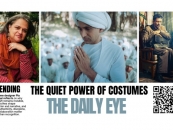-853X543.jpg)
TRENDING: A ‘NORMAL’ LOVE STORY, SAYS SRIDHAR RANGAYAN
by Editorial Desk February 18 2025, 12:00 am Estimated Reading Time: 4 mins, 42 secsKuch Sapney Apne, releasing in theatres on 21st February, redefines love with its heartfelt queer romance, proving that love transcends labels. Its soulful anthem, "Tu Sunn Zara," is set to become India’s LGBTQ+ romantic classic. The #Newsdesk reports...
Kuch Sapney Apne, the latest queer romantic drama by National Award-winning filmmaker Sridhar Rangayan, is a heartfelt exploration of love beyond labels. Set for theatrical release on February 21st, this film delves into the struggles and triumphs of a gay couple navigating family dynamics, societal expectations, and the universal highs and lows of relationships. Its soul-stirring song, "Tu Sunn Zara," released on Valentine’s Day, is already gaining traction as India’s LGBTQ+ anthem. Starring Satvik Bhatia and Arpit Chaudhary, the film promises a compelling narrative that celebrates love, resilience, and the courage to stand together.
Kuch Sapney Apne, the queer romantic drama directed by National Award-winning filmmaker Sridhar Rangayan, is set to release in select theatres across India. Before the film hits the screens, its song “Tu Sunn Zara,” released on Valentine’s Day, is poised to become the new romantic anthem for the LGBTQ+ community.
The film follows the journey of a gay couple and their families, exploring the universal truth that love is love. It highlights the challenges all relationships face—queer or otherwise—reminding us that love, in any form, is worth fighting for.
Every relationship has its own share of highs and lows. What truly keeps it going is the mutual understanding and respect between the individuals involved. In Kuch Sapney Apne, Kartik and Aman’s love story faces challenges, much like any other relationship. Though it would have been easy for them to give up, their journey of overcoming these hurdles together forms the heart of the story. The film powerfully conveys that all relationships, whether queer or not, are built on the same foundation of love, trust, and resilience.
Sridhar Rangayan, director of the film, said, “It is a ‘normal’ love story, just like any other love story, the only difference being—it is love between two men. Love and heartbreak are part of every relationship, and what finally matters is what they truly feel for each other. In the film, the gay characters are treated just like every other character—they are just human and go through every emotion that every human being goes through.”

The Song "Tu Sunn Zara" is Poised to Be the Iconic Romantic Anthem for the Indian LGBTQ+ Community
The Valentine’s song “Tu Sunn Zara” features singers Shashwat Singh and Sushant Divgikar and is composed by Nishith Hegde and Ashwin Shreyan. The lyrics are penned by Saagar Gupta, who is also the co-director and dialogue writer of the film.
Saagar Gupta said, “I was thrilled to pen the lyrics for ‘Tu Sunn Zara,’ a song that beautifully captures the love between Kartik and Aman. It’s not just about their present love but also about the promise to stand by each other, even in the silver years. The song radiates happiness and hope! At its core, it’s a unisex love song, celebrating two people in love, navigating life together—regardless of gender or sexuality.”
The film also explores the love stories of three other couples: Kartik’s parents, whose relationship faces challenges but ultimately finds reconciliation; his divorced aunt, who falls in love and remarries; and another aunt, whose marriage is tested by difficult truths.
Satvik Bhatia, whose earlier credits include Madhur Bhandarkar’s Lockdown, Kota Factory, and many ad films, stars as Kartik in Kuch Sapney Apne. He says, “When I got the opportunity to shoot for Kuch Sapney Apne, I was very excited. Mainly because the character I was playing was completely different from who I am in real life. I’m a Punjabi guy, but this guy—he’s from the southern part of India. That itself was a challenge, but a very exciting one.”
“There was this pressure because Evening Shadows (the prequel to KSA) had already set a benchmark, and another actor had played this character before me. But then I was given a simple but powerful piece of advice—‘Play it as you feel in the moment.’ That completely changed my approach. Once I let go of the pressure and just lived in the character, I actually started enjoying the process. And that, for me, is the best part about acting,” he added.
Arpit Chaudhary, an upcoming actor with credits in a couple of TV series, ad films, and the Sri Lankan film Bimba Devi, whose role in Evening Shadows broke new ground, says, “It was an enriching experience as an artist portraying Aman. I see Aman as an anchor in his partner Kartik’s life, an anchor who believes in growth and stability in his relationship. We say that love should have no boundaries, but many boundaries are tested in this film when it comes to Aman and Kartik, Damodar and Vasusha, or Damodar and his brother.”
Speaking about how actors hesitate to accept roles that are different and diverse, Arpit Chaudhary said, “I think despite their sexuality, they still portray the same human emotions, and as an artist, I believe in not taking it personally. It’s a character that I portrayed.”
The film is set to release in theatres in select cities on February 21st. The theatre list will be updated on the BookMyShow link here.





-173X130.jpg)
-173X130.jpg)

-173X130.jpg)
-173X130.jpg)
-173X130.jpg)
-173X130.jpg)
-173X130.jpg)